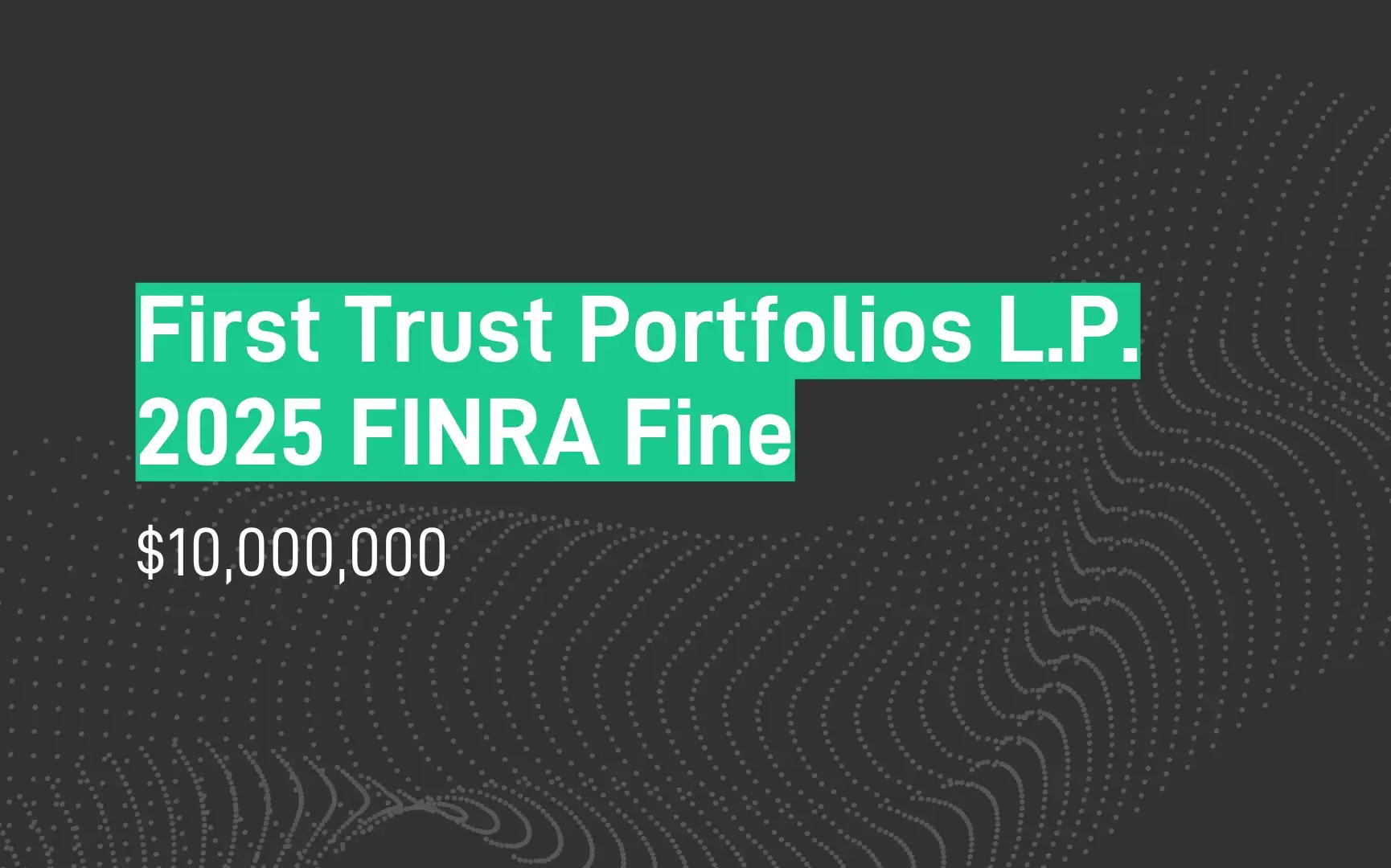This blog serves as a comprehensive guide to the voice recording and record-keeping requirements for financially regulated firms operating within the United States, focusing on the rules and guidance issued by:
-
The Commodity Futures Trading Commission (CFTC)
-
The Financial Industry Regulatory Authority (FINRA)
-
The Securities and Exchange Commission (SEC)
-
The National Futures Association (NFA)
The regulatory landscape is complex. This blog serves as a central resource to navigate these varied rules, considerations, and implementation strategies. For a quick reference, a downloadable guide summarising all the key regulations is also available.
Key Takeaways
-
US Rules are Not One-Size-Fits-All.
-
Unlike the broader mandates seen in the UK and EU, US voice recording obligations are highly fragmented. Requirements are determined by your firm’s specific regulator (e.g., CFTC, SEC, FINRA), its business activities (e.g., dealing in swaps), and risk factors, such as hiring history which can trigger stringent "taping rules."
-
"Business as Such" Creates Pervasive Obligations.
-
Even if your firm is not subject to an explicit taping rule, the general requirement from regulators like the SEC and FINRA to retain all communications "relating to the firm's business as such" is critical. Aggressive enforcement against uncaptured communications on channels like WhatsApp and text messages means this standard implicitly extends to voice calls, creating significant compliance risk if they are ignored.
-
A Proactive Strategy is Essential.
-
Due to the complexity of the rules and the severe penalties for non-compliance, a passive approach is insufficient. Firms must proactively develop clear policies, deploy technology that can capture and retain communications across all channels (including mobile and VoIP), and ensure staff are rigorously trained to mitigate regulatory risk.
Contents
Introduction

A foundational principle across all regulators is the requirement to retain electronic communications related to a firm's 'business as such', a broad standard interpreted based on content rather than the communication device used. While not all regulators explicitly mandate voice recording for all firms, the interpretation of 'business communications' and aggressive enforcement actions against failures to capture off-channel communications (including text messages and messaging apps) imply a growing expectation for firms to address voice communications within their compliance frameworks.
-
The CFTC requires certain registrants (FCMs, IBs, RFEDs, some DCM/SEF members) and Swap Dealers (SDs) to record oral communications that lead to commodity interest transactions, retaining these recordings for one year.
-
The SEC requires Security-Based Swap Dealers (SBSDs) to retain voice recordings as part of their daily trading records.
-
Both FINRA (Rule 3170) and the NFA (Interpretive Notice 9070) impose stringent 'taping rules' requiring specific firms, identified as higher risk due to their history of hiring personnel from disciplined firms, to record all telephone conversations between registered persons/APs and customers. Retention periods under these taping rules are three years (FINRA) and five years (NFA) respectively.
For firms not subject to these explicit mandates (e.g., general broker-dealers, investment advisers, other NFA members), the obligation hinges on general record-keeping rules (SEC Rules 17a-4 and 204-2, FINRA Rule 4511, NFA Rule 2-10). These rules necessitate retaining business communications, potentially including voice calls if their content pertains to regulated activities such as providing advice, handling orders or addressing complaints.
Additionally, this piece dissects the requirements emanating from the Investment Advisers Act of 1940 ('Advisers Act'), primarily focusing on Rule 204-2 (the 'Books and Records Rule') and Rule 206(4)-1 (the 'Marketing Rule'). It incorporates relevant SEC guidance, examines significant enforcement trends, contrasts the duties of RIAs and ERAs, and evaluates the implications of specific activities common to hedge fund, private equity and traditional asset managers. In totality, this blog will touch on the various voice recording requirements affecting the following kinds of firms:
-
Asset Manager (AM)
-
Broker-Dealer (General)
-
Broker-Dealer (FINRA Taping Firm)
-
CPO / CTA (NFA Member - General)
-
FCM / IB / RFED (CFTC Regulated)
-
Hedge Fund (HF)
-
Investment Adviser (IA)
-
NFA Member (NFA Taping Firm)
-
Private Equity (PE)
-
Swap Dealer (SD) (CFTC Regulated)
-
Security-Based Swap Dealer (SBSD)
Core record-keeping requirements emphasise data integrity, accessibility and prompt retrieval. SEC Rule 17a-4, influential across the regulatory spectrum, mandates storage using either non-rewriteable, non-erasable (WORM) technology or an electronic recordkeeping system (ERS) with a robust audit trail capability. Records must be easily accessible, searchable (with specific requirements from the CFTC and NFA), and producible to regulators promptly upon request, typically in a usable electronic format. Retention periods vary widely, from one year (CFTC oral recordings) to six years (FINRA default, certain SEC records), demanding sophisticated record management systems.
Foundational Record-Keeping Principles
Defining the Scope: 'Business Communications'
A central tenet across regulatory frameworks is the requirement for firms to capture and retain communications 'relating to the firm's business as such'. This standard is deliberately broad and is generally interpreted based on the content of the communication, rather than the specific device or platform used for its transmission. Consequently, the obligation potentially extends beyond traditional email to encompass a wide array of modern communication methods, including instant messages, text messages, social media interactions and, pertinent to this report, voice communications, depending on the specific rule and the nature of the communication. Specific rules illustrate this principle:
-
SEC Rule 17a-4(b)(4), applicable to broker-dealers, explicitly mandates the preservation of 'originals of all communications received and copies of all communications sent...relating to its business as such'.
-
SEC Rule 204-2(a)(7) imposes a similar requirement on Investment Advisers for written communications concerning recommendations, advice or transactions involving client funds or securities.
-
CFTC Regulation 1.35 requires the retention of records pertaining to transactions in commodity interests and related cash or forward transactions, explicitly including written communications like emails and instant messages.
-
FINRA Rule 4511 compels member firms to preserve books and records mandated by both FINRA and SEC rules, encompassing correspondence and other communications related to their 'business as such'.
The breadth of the 'business as such' standard suggests a regulatory intent to capture a wide net of potential evidence for oversight and enforcement purposes. A narrowly defined standard could inadvertently create loopholes, allowing significant business-related discussions to evade scrutiny. This places the onus on firms to establish clear, defensible policies for identifying and retaining relevant communications, often leading to a conservative approach where the default assumption is that most professional communications are potentially subject to retention unless proven otherwise.
Retention Periods: A Variable Landscape
The duration for which financial communications must be preserved varies considerably, contingent upon the specific regulator, the type of record in question and the applicable rule. This variability introduces complexity for firms, especially those subject to oversight from multiple regulatory bodies or engaged in diverse business lines.
Key examples of differing retention periods include:
-
CFTC: Oral communications that lead to the execution of commodity interest transactions must be retained for one year. However, related written communications (email, IM, etc.) and other transaction records must generally be kept for five years. Records pertaining to swaps must be retained for five years following the swap's expiration, maturity, transfer, or assignment. NFA generally aligns with a five year retention period for member records.
-
SEC (Broker-Dealers via Rule 17a-4): Core business records, such as blotters and ledgers, generally require a six year retention period, with the first two years in an easily accessible place. Communications and certain other records typically fall under a three year retention requirement, again with the first two years being easily accessible.
-
SEC (Investment Advisers via Rule 204-2): The standard retention period is five years from the end of the fiscal year in which the record was last entered or used, with the initial two years requiring storage in an appropriate office of the adviser.
-
FINRA: Rule 4511 establishes a default retention period of six years for any books and records lacking a specific retention period under other FINRA or applicable SEC rules. However, recordings mandated under FINRA's specific Taping Rule (Rule 3170) require only a three year retention period, with the first two years easily accessible.
This lack of uniformity stems from regulators setting rules based on their distinct statutory mandates and oversight priorities. For instance, the CFTC's shorter one year retention for oral transaction records might prioritise immediate trade reconstruction capabilities, while longer SEC and FINRA periods may align with broader supervisory review cycles or statutes of limitation. Consequently, firms must often adopt the longest applicable retention period for any given record type across all relevant regulatory regimes to ensure comprehensive compliance, adding another layer to the complexity of record management systems.
Addressing Modern Communication Challenges
The rapid proliferation and adoption of diverse communication channels - including text messaging, third-party messaging applications like WhatsApp and Signal, and various social media platforms - present significant compliance challenges for financial firms.
Voice communication is subject to similar challenges, particularly with the prevalence of mobile phones and the increasing use of Voice over IP (VoIP) functionalities within messaging applications or dedicated calling apps. Several regulations explicitly acknowledge this, with FINRA Rule 3170 encompassing cellular phones and CFTC Regulation 1.35 covering mobile devices. The regulatory crackdown on unrecorded text-based off-channel messages logically extends to unrecorded business-related voice calls occurring on similar unmonitored platforms or personal devices. These present a parallel compliance gap and regulatory risk, necessitating similar technological solutions and robust policy enforcement to ensure capture and supervision.
Regulatory Deep Dive: Voice Recording Rules and Guidance

Building upon the foundational principles, this section examines the specific rules, regulations and guidance concerning voice recording and associated record-keeping issued by the CFTC, FINRA, SEC and NFA.
Commodity Futures Trading Commission (CFTC)
-
Key Rules: The primary regulations governing record-keeping, including oral communications, are CFTC Regulation 1.31 (Record Retention) and Regulation 1.35 (Recordkeeping). These rules were significantly shaped by the Dodd-Frank Act, which expanded their applicability, particularly concerning swaps.
-
Affected Entities: The voice recording requirements under Regulation 1.35(a) apply to Futures Commission Merchants (FCMs), Retail Foreign Exchange Dealers (RFEDs), Introducing Brokers (IBs) that have generated over $5 million in aggregate gross revenues in the preceding three years and members of Designated Contract Markets (DCMs) or Swap Execution Facilities (SEFs) who are registered or required to be registered with the CFTC. Swap Dealers (SDs) and Major Swap Participants (MSPs) are also subject to extensive recordkeeping obligations under CFTC Regulations Part 23 and Part 45, which include requirements for daily trading records encompassing voice communications.
-
Voice Recording Mandate (Reg 1.35(a)): This rule mandates the recording of all oral communications provided or received concerning quotes, solicitations, bids, offers, instructions, trading and prices that lead to the execution of a transaction in a commodity interest. Commodity interests generally include commodity futures contracts, commodity options contracts, retail foreign exchange transactions and swaps. The recording obligation applies regardless of the medium used for the oral communication, including telephone, voicemail, mobile devices or other digital or electronic media.
-
Exclusions: A significant exclusion exists for oral communications that lead solely to the execution of a related cash or forward transaction; these generally do not need to be recorded. Additionally, face-to-face conversations are not subject to the recording requirement unless they occur via electronic, digital or other media.
-
Record-Keeping Specifics:
-
Retention: Recordings of oral communications mandated under Regulation 1.35(a) must be retained for a period of one year from the date the recording was created. This contrasts with the retention period for written communications (including emails, IMs, chats) related to the same transactions, which must be kept for five years. Swap-related records have specific retention requirements tied to the lifecycle of the swap, typically five years post-expiration or termination.
-
Format/Accessibility: All records, including oral recordings, must be maintained in a form and manner that is identifiable and searchable by transaction. The CFTC clarified that firms can comply by using searchable databases and are not required to compile records into individual electronic files for each transaction. Firms are expected to be able to retrieve records related to specific transactions promptly, potentially using electronic search capabilities or keyword identification.
-
Guidance/Interpretation: The CFTC has made clear that the recording obligation applies to relevant conversations irrespective of whether they take place on firm-issued equipment or personal devices. While acknowledging that firms might rely on third parties (e.g., an FCM recording calls involving its guaranteed IB) through formal written agreements, the ultimate compliance responsibility remains with the entity subject to the rule. The existence of good faith policies and procedures designed to achieve compliance can serve as a mitigating factor in enforcement contexts. Recent CFTC enforcement actions have underscored the importance of preventing the use of unapproved communication methods, such as personal text messages or WhatsApp, for business-related communications, indicating a focus on ensuring all relevant communications are captured within the firm's official systems.
The CFTC's voice recording requirement is thus specifically targeted at the transactional lifecycle for commodity interests, aiming to capture communications directly involved in the execution pathway (quotes, bids, orders, etc.), consistent with Dodd-Frank's objective of enhancing trade reconstruction capabilities. However, the precise scope of communications that 'lead to' a transaction can be ambiguous, requiring firms to carefully define the boundaries within their procedures. The disparate retention periods for oral (one year) versus written (five years) communications concerning the same transactions present a unique record management challenge, potentially reflecting historical perspectives on the long-term evidentiary value of different formats or compromises made during the rulemaking process.
Financial Industry Regulatory Authority (FINRA)
-
Key Rules: FINRA addresses voice recording primarily through two distinct rules: the highly specific Rule 3170 ('Taping Rule') and the general record-keeping requirements of Rule 4511.
-
Rule 3170 (Taping Rule):
-
Applicability: This rule imposes mandatory voice recording obligations only on a specific subset of FINRA member firms designated as 'taping firms'. A firm becomes subject to this rule if it exceeds certain thresholds related to hiring registered persons who were previously employed by firms that have been expelled from FINRA membership or had their registrations revoked due to sales practice violations ('disciplined firms'). These thresholds are based on the percentage of such individuals relative to the firm's total registered person count and vary by firm size. For example, a firm with 20 or more registered persons becomes a taping firm if 20% or more have been associated with one or more disciplined firms within the last three years. Firms are typically notified by FINRA if they meet the criteria, but they also have an obligation to self-identify.
-
Voice Recording Mandate: Taping firms are required to establish, maintain and enforce special written supervisory procedures specifically addressing the telemarketing activities of all their registered persons. A core component of these procedures is the requirement to tape record all telephone conversations between the firm's registered persons and both existing and potential customers. This mandate explicitly includes conversations conducted via cellular or mobile phones.
-
Record-Keeping/Supervision: The recordings made pursuant to Rule 3170 must be retained for a minimum period of three years from the date the recording was created, with the first two years requiring storage in an easily accessible place. Taping firms must catalogue these recordings by registered person and date. Furthermore, the rule mandates that firms review these tape recordings to ensure compliance with applicable securities laws and regulations. Taping firms must also submit quarterly reports to FINRA detailing their supervision of telemarketing activities. Upon becoming subject to the rule, a firm generally has 60 days to establish and implement the required taping procedures. Alternatively, a firm may avoid the taping requirement if it reduces its staffing levels below the triggering threshold within 30 days of notification or actual knowledge, subject to certain conditions.
-
Rule 4511 (General Requirements for Books and Records):
-
Applicability: This rule applies broadly to all FINRA member firms.
-
Requirement: Rule 4511 mandates that firms create and preserve books and records as required under FINRA rules, the Securities Exchange Act of 1934 (Exchange Act), and applicable Exchange Act rules. It specifically requires that records be preserved in a format and media compliant with SEC Rule 17a-4. The scope includes communications relating to the firm's 'business as such'.
-
Retention: For books and records required by FINRA rules that do not have a specified retention period under FINRA or SEC rules, Rule 4511 imposes a default retention period of at least six years.
-
Voice Implication: Rule 4511 does not contain an explicit, universal mandate for voice recording applicable to all member firms. However, its requirement to retain communications relating to 'business as such', coupled with its reference to SEC Rule 17a-4 standards, creates a potential obligation. If a voice communication's content falls within the scope of records required to be kept under SEC Rule 17a-4 (e.g., containing information equivalent to a retainable email relating to business), then Rule 4511 would implicitly require its preservation, even for a firm not subject to the Rule 3170 taping mandate.
-
Guidance/Interpretation: FINRA guidance clarifies that the determination of whether a communication relates to 'business as such' hinges on its content, not the type of device used. Enforcement actions demonstrate that FINRA actively penalises firms subject to the Taping Rule for failures in designing, implementing or reasonably enforcing their taping procedures. The Taping Rule itself is fundamentally a risk-based supervisory tool, designed to impose heightened oversight on firms whose hiring practices suggest a potentially elevated risk of sales practice violations.
FINRA's regulatory scheme for voice recording thus presents a bifurcated approach. Rule 3170 imposes a stringent, comprehensive recording requirement, but only on a targeted group of firms identified through specific risk-based criteria related to past disciplinary history. This contrasts with the transaction-focused mandate of the CFTC. For the majority of FINRA member firms not designated as 'taping firms', the obligation regarding voice calls is less explicit. These firms must navigate the general requirements of Rule 4511 and the incorporated standards of SEC Rule 17a-4. This creates a potential compliance tension: while not obligated to record all calls, these firms must have a defensible methodology for determining when the content of a voice call constitutes a communication 'relating to business as such' that necessitates retention under the general rules. Failure to retain such a call could lead to a violation, highlighting the need for careful internal policies, potentially involving selective recording or detailed call-logging practices.

Securities and Exchange Commission (SEC)
The SEC's requirements related to voice recording stem primarily from its general books and records rules for broker-dealers and investment advisers, as well as specific mandates related to security-based swaps introduced by Dodd-Frank.
-
Key Rules: For Broker-Dealers (BDs), the relevant rules are Exchange Act Rule 17a-3 (Records to be Made by Certain Exchange Members, Brokers and Dealers) and Rule 17a-4 (Records to be Preserved by Certain Exchange Members, Brokers and Dealers). For Investment Advisers (IAs), the primary rule is Rule 204-2 under the Investment Advisers Act of 1940 (Books and records to be maintained by investment advisers). The regulatory obligations applicable to an investment adviser, particularly concerning record-keeping, are fundamentally determined by its registration status with the SEC. Hedge fund, private equity and traditional asset managers typically fall into one of two main categories: Registered Investment Advisers (RIAs) or Exempt Reporting Advisers (ERAs). Specific rules also apply to Security-Based Swap Dealers (SBSDs) and Major Security-Based Swap Participants (MSBSPs), largely mirroring the BD rules but with added requirements.
-
Broker-Dealers (Rule 17a-4):
-
Requirement: Rule 17a-4(b)(4) mandates that BDs preserve originals of all communications received and copies of all communications sent (including inter-office memoranda and communications) 'relating to its business as such'.
-
Voice Recording Implication: An amendment to Rule 17a-4(b)(4) explicitly incorporated 'recordings of telephone calls required to be maintained pursuant to section 15F(g)(1) of the Act (15 U.S.C. 78o-10(g)(1))'. This directly references the requirement for SBSDs (discussed below). For general BDs not dealing in security-based swaps, there is no blanket requirement under Rule 17a-4 to record all voice calls. However, similar to the analysis under FINRA Rule 4511, if the content of a voice call constitutes a communication "relating to business as such," it would fall under the general preservation requirement of Rule 17a-4(b)(4). The determination of which calls meet this standard requires careful interpretation by the firm.
-
Retention: Communications records under Rule 17a-4(b)(4) generally must be preserved for three years, with the first two years in an easily accessible place. Other core records, such as blotters and ledgers, require a six year retention.
-
Format: Records must be preserved using either WORM-compliant media or an ERS employing the audit-trail alternative, ensuring integrity and accessibility. Prompt production capabilities are mandatory.
-
Investment Advisers (Rule 204-2):
-
Requirement: Rule 204-2 requires IAs to make and keep true, accurate and current specified books and records. This includes standard accounting records (journals, ledgers, financial statements), records of securities transactions (order memoranda, confirmations), documentation related to client accounts (agreements, discretionary authority instruments), client communications, advertising materials, records supporting performance calculations, compliance program documents (including the Code of Ethics and policies) and corporate governance records. The rule's reach was effectively broadened by the Dodd-Frank Act, which subjected many previously exempt hedge fund and private equity fund managers to SEC registration and, consequently, to Rule 204-2. This includes, under Rule 204-2(a)(7), originals of all written communications received and copies of all written communications sent relating to recommendations, advice, receipt/disbursement of funds or securities, placing of orders and execution of transactions. The rule also covers the retention of advertisements, which, under the SEC's updated Marketing Rule (Rule 206(4)-1), has a broad definition but may exclude certain 'extemporaneous, live, oral communications'. However, records substantiating advertised performance claims must be kept, and records of disclosures provided for compensated oral testimonials might be required.
-
Voice Recording Implication: Rule 204-2(a)(7) explicitly refers to 'written communications'. There is no general mandate for IAs to record routine client telephone calls. However, the line can blur with electronic messaging, which may include voice messages or calls conducted via applications. Furthermore, if the substance of a voice call contains information that would otherwise be required to be documented if written (e.g., specific investment advice given, client instructions received), the IA must ensure that the required record is created and maintained, potentially through contemporaneous notes or summaries. Failure to adequately document such interactions could be viewed as a books and records violation. The Marketing Rule's treatment of oral advertisements and testimonials also introduces scenarios where recording or detailed record-keeping of oral communications might be necessary. The proliferation of artificial intelligence (AI) tools capable of transcribing and summarising meetings and calls introduces a new dimension to voice communication record-keeping:
-
Transformation to 'Written' Record: When voice communications, such as conversations during video conferences (e.g., Zoom, Microsoft Teams) or potentially even phone calls, are processed by AI tools (e.g., Microsoft Copilot, Zoom AI Companion) to generate text-based transcripts or summaries, the output itself constitutes a written record. The oral conversation is transformed into a tangible, electronic document (watch out for a follow up piece where we’ll discuss this topic in more detail!)
-
Retention: Records under Rule 204-2 must generally be maintained for five years from the end of the fiscal year during which the last entry was made or the record was used, with the first two years in an appropriate office of the IA.
-
Format: Electronic recordkeeping is permitted, provided the IA establishes procedures to safeguard records, limit access, and ensure prompt production capabilities.
-
Security-Based Swap Dealers (SBSDs): Dodd-Frank added Section 15F(g)(1) to the Exchange Act, which explicitly requires registered SBSDs and MSBSPs to 'maintain daily trading records', including, at a minimum, 'records of all oral and written communications provided or received concerning quotes, solicitations, bids, offers, instructions, trading and prices' that lead to the execution of a security-based swap. This mandate is reflected in the cross-reference within the amended Rule 17a-4(b)(4). SEC Rule 18a-6 largely parallels Rule 17a-4 for SBSD recordkeeping.
-
Guidance/Interpretation: The SEC has demonstrated a very low tolerance for failures to capture business-related communications conducted via off-channel methods, imposing substantial penalties on firms whose employees used personal devices and unauthorised apps (like WhatsApp or text messages) for business without proper retention. SEC Risk Alerts have repeatedly emphasised the need for advisers and broker-dealers to implement robust policies, procedures, training and technological solutions to monitor and retain electronic communications across all platforms used for business purposes, including personal devices. The interpretation of what constitutes a required 'communication' is broad and continues to adapt to new technologies.
Compared to the CFTC's specific transaction trigger or FINRA/NFA's risk-based taping rules, the SEC's general rules for BDs and IAs create a less explicit, yet potentially pervasive, obligation regarding voice recording. The requirement hinges on the interpretation of whether the content of a voice call falls within the scope of 'communications relating to business as such' (for BDs) or aligns with specific record categories mandated for IAs (like advice or orders). The intense enforcement focus on capturing all business communications, regardless of the medium used , puts pressure on firms to address voice calls within this framework, even in the absence of a universal recording mandate. This ambiguity often leads firms to implement policies requiring detailed logging or summarisation of significant calls, or in some cases, broader recording practices, to mitigate regulatory risk. However, the explicit mandate for voice recording for SBSDs clearly demonstrates the SEC's authority and willingness to impose such requirements for specific activities or entity types deemed to carry higher risks, mirroring the approach seen under Dodd-Frank for CFTC-regulated swaps.

National Futures Association (NFA)
The NFA, as a self-regulatory organisation for the U.S. derivatives industry, sets forth record-keeping and supervisory requirements for its members, including specific provisions that can trigger voice recording obligations.
-
Key Rules: NFA Compliance Rule 2-10 establishes general recordkeeping requirements. Interpretive Notice 9070, titled 'NFA Compliance Rule 2-9: Enhanced Supervisory Requirements' (which replaced a prior version, Notice 9021) , outlines specific 'taping rule' provisions. NFA Rule 2-38 addresses Business Continuity and Disaster Recovery Planning, relevant to record preservation.
-
Rule 2-10 (Record keeping): This rule applies to all NFA Members, including FCMs, IBs, Commodity Pool Operators (CPOs), Commodity Trading Advisors (CTAs) and Retail Foreign Exchange Dealers (RFEDs). It requires them to maintain adequate books and records of their commodity interest business and have them available for inspection. The standard retention period under this rule is five years, with records needing to be readily accessible for the most recent two years.
-
Interpretive Notice 9070 (Enhanced Supervisory Requirements / Taping Rule):
-
Applicability: Similar in principle and purpose to FINRA's Taping Rule, NFA's Notice 9070 imposes enhanced supervisory requirements, including mandatory voice recording, on certain NFA members (FCMs, IBs, CPOs, CTAs and Forex Dealer Members - FDMs). These requirements are triggered if the member meets specific criteria established by NFA's Board of Directors, primarily related to employing a certain number or percentage of Associated Persons (APs) who were previously associated with firms formally charged by the CFTC or NFA with deceptive sales practices or promotional material violations.
-
Voice Recording Mandate: Member firms subject to these Enhanced Supervisory Requirements must implement specific procedures, including making complete audio recordings of all telephone conversations that occur between their APs and both existing and potential customers or pool participants. The notice also explicitly requires these firms to maintain records of all electronic written communications (defined broadly to include email, text messages, instant messages via web or social media, chat rooms, etc.) between their APs and customers or potential customers.
-
Record-Keeping/Supervision: Both the audio recordings and the records of electronic written communications mandated under Notice 9070 must be retained for a period of five years from the date the recording was created or the communication occurred. These records must be readily accessible and catalogued by AP and date. Firms subject to the notice must be able to promptly produce, upon request from NFA or the CFTC, all recorded conversations or electronic written communications relating to a specific AP for a given date. Additionally, these firms must require their APs to maintain a daily log documenting sales solicitations, including the identity of individuals contacted and the method of communication.
-
Guidance/Interpretation: NFA guidance emphasises the need for members to establish and implement adequate supervisory procedures for all electronic communications related to their commodity interest business, including ensuring that employees use only authorised communication systems. While NFA rules allow flexibility in the specific methods and technologies used, the supervisory system must be reasonably designed to achieve compliance, covering communications via email, instant messaging, text messaging and potentially personal devices if used for business. The determination of whether a specific communication is subject to recordkeeping requirements depends on its content and relation to the member's business. NFA Rule 2-38 also mandates written business continuity and disaster recovery plans, which inherently include provisions for protecting and accessing critical records.
The NFA's framework for voice recording closely parallels FINRA's approach. A specific, risk-based trigger (association with firms disciplined for sales practice violations) activates a stringent requirement to record all calls for the affected members under Notice 9070. This reflects a shared regulatory philosophy targeting perceived higher-risk firms with heightened surveillance measures. A key difference lies in the retention period: NFA mandates five years for these recordings , aligning with its general recordkeeping rule (Rule 2-10) , whereas FINRA's Taping Rule specifies three years. For NFA members not subject to Notice 9070, the situation mirrors that of non-taping FINRA firms. They remain subject to the general record-keeping obligations of Rule 2-10 and the broad supervisory requirements for electronic communications. This creates a similar ambiguity regarding the necessity of recording voice calls whose content might be deemed essential for explaining business activities or fall under the umbrella of supervisable electronic communications (e.g., calls via apps/VoIP). These firms
must develop clear internal policies to address this potential compliance gap.
Comparative Analysis: Requirements Across Firm Types
Overview of Divergent Requirements
The preceding analysis demonstrates that the regulatory landscape for voice recording in the U.S. financial sector is far from uniform. Obligations vary considerably depending on several factors: the firm's specific registration(s) (e.g., Broker-Dealer, Investment Adviser, Futures Commission Merchant, Swap Dealer), the primary regulator(s) overseeing those registrations (SEC, CFTC, FINRA, NFA), the nature of the firm's business activities (e.g., dealing in swaps, engaging in retail telemarketing), and specific circumstances such as the firm's hiring history (triggering FINRA or NFA taping rules). This fragmentation requires firms, particularly those holding multiple registrations or engaging in diverse activities, to navigate a complex web of potentially overlapping or even conflicting requirements.
Click here to download a breakdown of the key voice requirements by firm type and regulator in a handy table identifying the level of requirement, key notes and retention period:

Conclusion and Considerations
Considerations for Firms:
Navigating this complex environment requires a proactive, informed and strategic approach to compliance. Firms should consider the following actions:
-
Know Your Obligations: Conduct a comprehensive internal assessment to identify all applicable voice recording and record-keeping rules based on the firm's specific registrations (SEC, CFTC, FINRA, NFA), business lines, product offerings and risk factors (including hiring practices relevant to FINRA/NFA taping rules). This assessment should clearly delineate where explicit mandates apply versus where obligations arise from general rules.
-
Develop Robust Policies and Procedures: Establish clear, written policies that define what constitutes 'business communication' across all mediums, including voice. Specify approved communication channels and explicitly address the use of personal devices (BYOD) for business purposes. Outline detailed procedures for recording (where mandated or deemed necessary), retention according to the longest applicable period, supervision and retrieval of voice communications.
Final Recommendation:
The US regulatory framework for voice recording is a patchwork of specific mandates and broad principles. For firms not subject to explicit taping rules from FINRA or the NFA, the obligation to retain communications relating to "business as such" remains a potent and ambiguous risk. Given the regulators' zero-tolerance approach to off-channel communications, firms can no longer leave voice compliance to chance.
Consequently, the most prudent strategy is to build a compliance framework for the future. This involves adopting a holistic view of "business communications," irrespective of the medium, and investing in unified compliance technology that can capture, analyse, and retain data from all channels. By treating every business conversation as a potential record, firms can not only satisfy the fragmented rules of today but also build a resilient foundation capable of withstanding the more integrated and data-driven regulatory expectations of tomorrow.
















